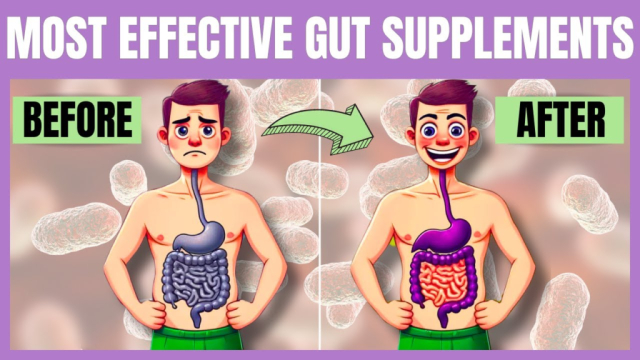
Introduction to Gut Health and its Importance
Gut health refers to the balance and function of the complex system of microorganisms that reside in our gastrointestinal tract. These microorganisms, collectively known as the gut microbiome, are integral to numerous processes in the body, from digesting food to regulating the immune system and influencing mood. A healthy gut is not merely the absence of ailments; it is a thriving ecosystem where beneficial bacteria flourish while harmful ones are kept in check.
The basics of our digestive system involve a coordinated effort between organs like the stomach, intestines, and liver, aided by a variety of natural digestive supplements. This coordinated effort ensures the breakdown of food into nutrients, which the body absorbs and uses for energy, growth, and cell repair. When the delicate balance of the gut microbiome is disrupted, it can lead to issues such as bloating, constipation, diarrhea, and other digestive discomforts.
Beyond digestion, the gut plays a significant role in maintaining our immune system. Approximately 70% of the immune system is housed in the gut, making it imperative to support its function with probiotics for gut health. These beneficial bacteria help protect against pathogens and potentially harmful microbes, thus contributing to overall immunity. Various immune-boosting gut supplements are designed to sustain this vital barrier.
Moreover, there is a growing body of research linking gut health to mental well-being. The gut-brain axis is a communication network that connects the gut and brain, aiding in the regulation of mood and emotions. Imbalances in the microbiome can impact this axis, potentially leading to anxiety, depression, and other mood disorders. Hence, maintaining a balanced gut with the best prebiotics for digestion and gut healing supplements is key to overall well-being.
Understanding the multifaceted importance of gut health highlights the necessity of incorporating organic gut health products and other natural digestive supplements into our daily routines. The subsequent sections of this blog will delve deeper into the types of gut health supplements, their benefits, and how they support a balanced, healthy digestive system and beyond.
Understanding the Microbiome: The Ecosystem Within
The human microbiome is a complex ecosystem residing predominantly within the gastrointestinal tract. It encompasses trillions of microorganisms, including beneficial and harmful bacteria, fungi, viruses, and archaea. A delicate balance exists between these different types of microorganisms, which plays a pivotal role in maintaining various physiological processes essential for overall health.
One of the most significant functions of the microbiome is aiding digestion. Beneficial bacteria in the gut help break down complex carbohydrates, fibers, and proteins, facilitating the absorption of vital nutrients. Natural digestive supplements often incorporate probiotics and digestive enzymes to support this digestive process. Regular intake of probioticos for gut health helps preserve a favorable microbial balance, essential for optimal nutrient uptake.
Beyond digestion, the microbiome exerts a profound influence on the immune system. Immune-boosting gut supplements can enhance the body’s defense mechanisms by reinforcing the gut barrier and modulating immune responses. A well-balanced microbiome helps to inhibit the growth of pathogenic bacteria, reducing the risk of infections and inflammatory conditions. Digestive and immune health are closely intertwined, highlighting the importance of microbiome support supplements to strengthen both areas.
The importance of a balanced microbiome extends beyond digestion and immunity. Research has shown that an imbalanced microbiome can contribute to various chronic conditions, including obesity, diabetes, and even mental health disorders like anxiety and depression. Thus, maintaining a healthy gut environment through gut health supplements remains a critical aspect of overall well-being. Natural digestive supplements, including the best prebiotics for digestion, work synergistically to nourish beneficial bacteria, promoting a harmonious microbial ecosystem.
In summary, the microbiome is an intricate community that profoundly impacts our health. Ensuring a balanced microbial environment through dietary choices and supplementation with organic gut health products and gut healing supplements is imperative for digestive health, nutrient absorption, and immune function. Understanding and supporting this internal ecosystem can pave the way for enhanced well-being and vitality.
Top-Rated Probiotics for Gut Health
Probiotics, often referred to as beneficial bacteria, play a crucial role in maintaining a balanced gut microbiome and overall digestive health. These microorganisms, including common strains such as Lactobacillus and Bifidobacterium, offer a variety of health benefits. Specifically, Lactobacillus can help convert lactose into lactic acid, aiding digestion and preventing harmful bacterial growth. Meanwhile, Bifidobacterium supports the immune system and reduces inflammation in the gut.
To truly reap the benefits of probiotics for gut health, it is essential to choose high-quality supplements. Among the top-rated probiotic products available are those containing diverse strains, high colony-forming units (CFUs), and prebiotics for enhanced efficacy. For instance, supplements like Culturelle Digestive Health Probiotic and Garden of Life’s Raw Probiotics offer potent combinations of probiotics, specifically designed for digestive health and overall well-being.
When selecting the best probiotics for your needs, consider factors such as the number of strains, CFU count, and your specific health concerns. For general digestive support, a supplement with a mix of Lactobacillus and Bifidobacterium strains and an average CFU count can be very effective. However, for targeted issues like irritable bowel syndrome (IBS) or inflammatory bowel disease (IBD), a specialized strain such as Lactobacillus rhamnosus GG or Bifidobacterium infantis may be more beneficial.
Moreover, consulting with a healthcare professional before starting any probiotic regimen is advisable. This ensures that you choose a probiotic supplement that aligns with your specific health needs, providing the right support for your digestive health and enhancing your overall immune function. Properly selected probiotics can be instrumental in maintaining healthy gut flora, acting as essential gut health supplements that contribute to your wellbeing.
Prebiotics: Fueling the Good Bacteria
Prebiotics play a critical role in maintaining optimal gut health by serving as the nourishment for beneficial bacteria in the digestive system. Essentially, prebiotics are non-digestible food components that travel through the gastrointestinal tract to reach the colon, where they act as a food source for the probiotics living there. This symbiotic relationship between prebiotics and probiotics is foundational for a balanced and healthy microbiome.
Prebiotics work by selectively stimulating the growth and activity of advantageous microorganisms within the gut. This process not only enhances digestive health but also protects against the proliferation of harmful bacteria. A well-supported microbiome translates into improved digestion, better nutrient absorption, and a strengthened immune system. Moreover, prebiotics can help in the production of short-chain fatty acids (SCFAs) which further benefit colon health and overall metabolic processes.
Incorporating prebiotic-rich foods into your diet provides a natural way to promote gut health. Foods such as garlic, onions, leeks, asparagus, bananas, and oats are excellent sources of natural prebiotics. These options are not only accessible but also versatile, making it easier to maintain a gut-friendly diet daily.
For those looking for an extra boost, many natural digestive supplements in the market are specifically formulated to deliver concentrated doses of prebiotics. Top-rated prebiotic supplements often include ingredients like inulin, chicory root, and fructooligosaccharides (FOS). These supplements come in various forms, including powders, capsules, and chewables, allowing for convenient integration into one’s lifestyle.
Selecting the best prebiotics for digestion can significantly impact overall gut health. As with any supplement, it is advisable to consult with a healthcare provider to identify the most suitable option tailored to individual health needs. By nurturing your gut with proper prebiotics, you set the foundation for enhanced digestion, improved immunity, and a balanced gut microbiome.
Digestive Enzymes: Enhancing Nutrient Absorption
Digestive enzymes play a pivotal role in maintaining gut health by breaking down food into its constituent nutrients, which the body can readily absorb. These enzymes are specific proteins produced by the stomach, pancreas, and intestines, each designed to target and decompose different types of food molecules. The primary types of digestive enzymes include amylases which target carbohydrates, proteases which break down proteins, and lipases that are essential for fat digestion.
The proper functioning of these enzymes is crucial for optimal digestive health. When your body lacks adequate levels of digestive enzymes, it can result in various digestive issues, including bloating, gas, indigestion, and nutrient deficiencies. Supplementing with digestive enzymes can ameliorate these issues by enhancing the digestive process, ensuring that nutrients are effectively absorbed, and supporting overall gut health. This makes digestive enzymes an invaluable addition to any regimen focused on natural digestive supplements and gut healing supplements.
Specific digestive enzyme supplements can address targeted digestive problems. For instance, lactase supplements can benefit individuals with lactose intolerance by aiding in the digestion of dairy products. Similarly, alpha-galactosidase can help break down complex carbohydrates found in legumes and cruciferous vegetables, reducing bloating and gas. These targeted supplements offer a customized approach to alleviating specific digestive discomforts, making them an integral component of organic gut health products.
When choosing the best digestive enzyme supplements, it’s important to consider factors such as enzyme potency, the spectrum of enzymes included, and additional ingredients that may support gut health. Reputable brands offering high-quality digestive enzyme supplements often combine multiple enzymes, providing comprehensive support for digestion. Products free from allergens and artificial additives are preferable to ensure they are suitable for a wide range of users.
In summary, digestive enzymes supplements are essential for enhancing nutrient absorption, mitigating digestive distress, and supporting overall gut health. By ensuring thorough food breakdown and efficient nutrient uptake, these supplements contribute to a balanced microbiome and improved digestive function.
Fiber Supplements: Supporting Regularity and Gut Health
Dietary fiber is a key component in promoting gut health, aiding in regular bowel movements, and fostering the growth of beneficial bacteria in the digestive system. Fiber comes in two primary forms: soluble and insoluble. Soluble fiber dissolves in water to form a gel-like substance, which helps to slow digestion. This fiber type can reduce cholesterol and stabilize blood sugar levels. Insoluble fiber, on the other hand, adds bulk to the stool and assists in moving food through the digestive tract, alleviating constipation.
Incorporating more fiber into your diet can significantly benefit your gut health. A variety of natural digestive supplements are available, providing a convenient way to meet your daily fiber requirements. Psyllium husk, derived from the seeds of the Plantago ovata plant, is a popular soluble fiber supplement known for its effectiveness in promoting regularity and improving gut health. Another noteworthy supplement is inulin, a type of prebiotic fiber that stimulates the growth of probiotics for gut health, thus supporting a balanced microbiome.
Several high-quality gut health supplements on the market offer a combination of soluble and insoluble fibers, which can be helpful for those seeking to enhance their digestive health. Some top-rated options include Metamucil, Benefiber, and Garden of Life’s Organic Fiber. These products are designed to provide optimal support for digestive health while enhancing the overall functionality of the digestive system.
To naturally increase your daily intake of fiber, integrating fiber-rich foods like fruits, vegetables, legumes, and whole grains into your meals is highly beneficial. Consuming a variety of these foods ensures you get an adequate mix of soluble and insoluble fibers. Additionally, ensuring proper hydration is essential when consuming more fiber, as water helps fiber to work more effectively in the digestive system.
In summary, fiber supplements play a crucial role in supporting regularity and gut health by promoting beneficial bacteria growth and aiding digestion. By choosing high-quality supplements and incorporating fiber-rich foods into your diet, you can enhance your gut health, improve digestion, and maintain a balanced microbiome.
Herbal Supplements: Natural Remedies for Gut Health
Herbal supplements play a vital role in promoting gut health due to their natural, therapeutic properties. Among the most recognized are peppermint, ginger, and turmeric, each demonstrating unique benefits for digestive wellness. These herbal remedies have been utilized for centuries in various cultures, and modern research increasingly supports their efficacy.
Peppermint is widely renowned for its ability to soothe the digestive tract. It contains menthol, which can help relax the muscles of the gastrointestinal system, thereby reducing symptoms of irritable bowel syndrome (IBS) and promoting overall digestive comfort. Peppermint supplements are a convenient way to incorporate this benefit into your diet, especially for those who experience frequent bloating or discomfort.
Ginger is another powerhouse for gut health. Known for its anti-inflammatory and antioxidant properties, ginger can significantly aid in digestion. It stimulates the production of digestive enzymes, which enhances the body’s ability to break down food and absorb nutrients. Ginger supplements are particularly beneficial for individuals dealing with nausea, vomiting, or gastrointestinal upset.
Turmeric, with its active compound curcumin, is celebrated for its anti-inflammatory benefits. Chronic inflammation in the gut can lead to various digestive disorders, including Crohn’s disease and ulcerative colitis. Turmeric helps to mitigate this inflammation, supporting the integrity of the gut lining and reducing the risk of such conditions. High-quality turmeric supplements often contain black pepper extract, which increases curcumin absorption and efficacy.
When choosing herbal supplements for digestion, it’s crucial to opt for high-quality products to ensure potency and purity. Look for brands that adhere to stringent manufacturing standards, use organic ingredients, and are transparent about their sourcing and processing methods. Incorporating these herbal supplements into your daily regimen can provide natural, effective support for gut health, enhancing digestion, and promoting overall well-being.
|
|
Choosing the Right Supplement for Your Needs
Selecting the ideal dietary supplement for gut health involves understanding individual needs and being diligent about product evaluation. Begin by thoroughly reading the labels to ensure the ingredients are natural and free from unnecessary additives or preservatives. Look for keywords like “organic gut health products,” “probiotics for gut health,” and “digestive enzymes supplements” to ensure you are getting high-quality supplements that target your specific concerns.
Individual health issues should also be considered. For instance, if you suffer from frequent bloating, a supplement rich in digestive enzymes might be advantageous. Alternatively, if you’re focused on overall digestive wellness, you might opt for natural digestive supplements or herbal supplements for digestion. Probiotics are essential for enhancing the gut microbiome, whereas the best prebiotics for digestion can offer additional support by feeding healthy gut bacteria.
Consulting with healthcare providers is crucial before adding any gut health supplements to your routine. A professional can offer personalized advice and recommend optimal dosage, ensuring the supplements you choose do not interfere with existing medications or health conditions. They might also suggest combining different products, such as probiotics and immune-boosting gut supplements, to achieve a synergistic effect.
Equally important is incorporating lifestyle modifications to support gut health. Maintain a balanced diet rich in fiber, whole grains, and fermented foods to naturally bolster your gut’s ecosystem. Regular physical activity can enhance digestive functions, while stress management techniques like yoga or mindfulness can prevent stress-related digestive issues.
Ultimately, a comprehensive approach involving both selective supplementation and healthy lifestyle choices will yield the best results for gut health. With the right combination tailored to your specific needs, you’ll be well on your way to improving digestion, boosting immunity, and achieving a balanced microbiome.
|
|


